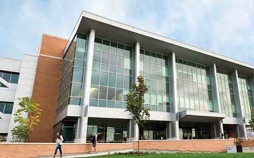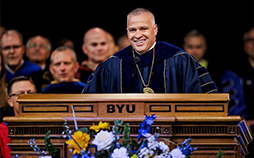Dedicated to Innovation: Engineering Building Dedication Recap
BYU’s new Engineering Building and Engineering Research Lab were 100% funded by 17,000 generous donors.
December 2024

As we near Brigham Young University’s sesquicentennial, our campus is charged with becoming “a Christ-centered, prophetically directed university of prophecy.” We have come a long way in nearly 150 years, but we are not there yet.
In statistics we talk about a process called change point detection. In essence, these are statistical methods that aim to detect changes either as soon as they occur in a real-time setting or retrospectively in samples of data collected in the past.
Our campus quest to become BYU will require change points. We may stumble along the way, but, with the right desire and the Lord’s enabling power, we will succeed. Our “Becoming BYU” efforts1 have led to a surge of positive momentum across campus around these seven initiatives:
Strengthening each student’s faith and testimony in Jesus Christ and His restored gospel and in living prophets and apostles has always been a part of BYU’s mission and aims. We must now be even more deliberate in our efforts to do this.
Our 2024 data show that 84 percent of graduating seniors say their BYU experience has had a strong or slight positive impact on their faith in Jesus Christ. Some 78 percent say their experience at BYU has had a strong or slight positive impact on their testimony of living prophets and apostles. And while this is good, we still have work to do.
Inspiring learning is core to strengthening the student experience. Inspiring learning experiences are high-impact learning opportunities that are also spiritually inspiring.
We aim for at least one inspiring, experiential learning opportunity for each student. But our ultimate goal is for every BYU student to have at least two such experiences during their time at the university. Our most recent data show that 95 percent of seniors report participating in one or more experiential learning activities, and 80 percent have two or more. External research suggests a strong relationship between two or more experiential learning opportunities and student success beyond their time on campus.
One of my favorite inspiring learning opportunities this past year involved a group of students—most of whom are international students—who visited historic Church sites. While in the Sacred Grove, they video chatted with family members in their home countries, sharing this singular opportunity with loved ones who might not have the chance to visit that sacred space themselves.
Our leadership is determined to offer those kinds of experiences to more students. Inspiring, experiential learning can happen right here on this campus—sometimes in classrooms, sometimes in labs, and yes, in uniquely designed campus work. Your support for this initiative has been foundational and is greatly appreciated.

We are also putting attention into enhancing University 101: BYU Foundations for Student Success, also known as UNIV 101. In the fall 2024 semester, for the first time, every first-year student was enrolled in one of 280 sections of this course. It has been a major feat to roll out this ambitious undertaking, including capping enrollment of each class at 25 students.
I was once a lost first-year student, and this class would have been exactly what I needed. In this course, our students will get a clear sense of mission, understand the resources available for their success, and have a sense of connectedness. I was heartened by what I witnessed as an instructor in this class, and I am excited to teach it again this semester.
Since BYU’s founding, teaching has been our emphasis and our tradition. Our focus on undergraduate teaching will not change, even as we continue with graduate programs of real consequence, including a new medical school. (Links to the First Presidency’s medical school announcement and updates from BYU are on the front page of this newsletter.) Teaching with excellence is emphasized in the faculty hiring and faculty advancement processes.
In recent survey data, 94 percent of BYU faculty report that they are intentional in their efforts to teach their subject “bathed in the light and color of the restored gospel.”2 We want every class at BYU to be both “intellectually enlarging” and “spiritually strengthening.”3
We are being deliberate about sharing BYU’s unique story, often with the taglines “For the Benefit of the World” or “Enter to Learn; Go Forth to Serve,” and we have seen some encouraging initial gains in the general public’s awareness of BYU from these efforts.

As you know, last year we entered the Big 12 Conference in athletics. We handed out ice cream to visiting opponents at home games. We tailgated at away games by performing local service projects for causes chosen by the opposing team’s alumni. We did TV spots on our own network to highlight the good our opponents’ alumni are doing. In West Virginia, where fans sometimes boo the opposing team as they take to the field, we ran out waving West Virginia’s own flag as a show of respect. The gesture garnered the attention of university leaders and local media.
Our motivation for these out-of-the-ordinary acts and hundreds, even thousands, of others that go unnoticed is not to garner attention but to reflect who we are and who we strive to be.
When it comes to university research investment, we are supporting scholarly efforts focused on three core institutions of society: the family, religion (including religious freedom), and constitutional government.

BYU can’t be the “Christ-centered, prophetically directed university of prophecy” if we lack the freedoms afforded by the Constitution and the blessings that flow from faith and the strong societal foundations of the family.
To become BYU, especially as we approach the halfway point of BYU’s second century, we need all the positive momentum we can get to be successful. President Nelson has taught, “We have never needed positive spiritual momentum more than we do now.”4
My friends, I love you. I express my sincerest gratitude and admiration for your Christlike labors of love. It is you who will help us become the “Christ-centered, prophetically directed university of prophecy.”
BYU Mission and Aims
President Spencer W. Kimball, “The Second Century of Brigham Young University”

BYU’s new Engineering Building and Engineering Research Lab were 100% funded by 17,000 generous donors.

As we take the following steps, I believe that we will be blessed both individually and institutionally.
